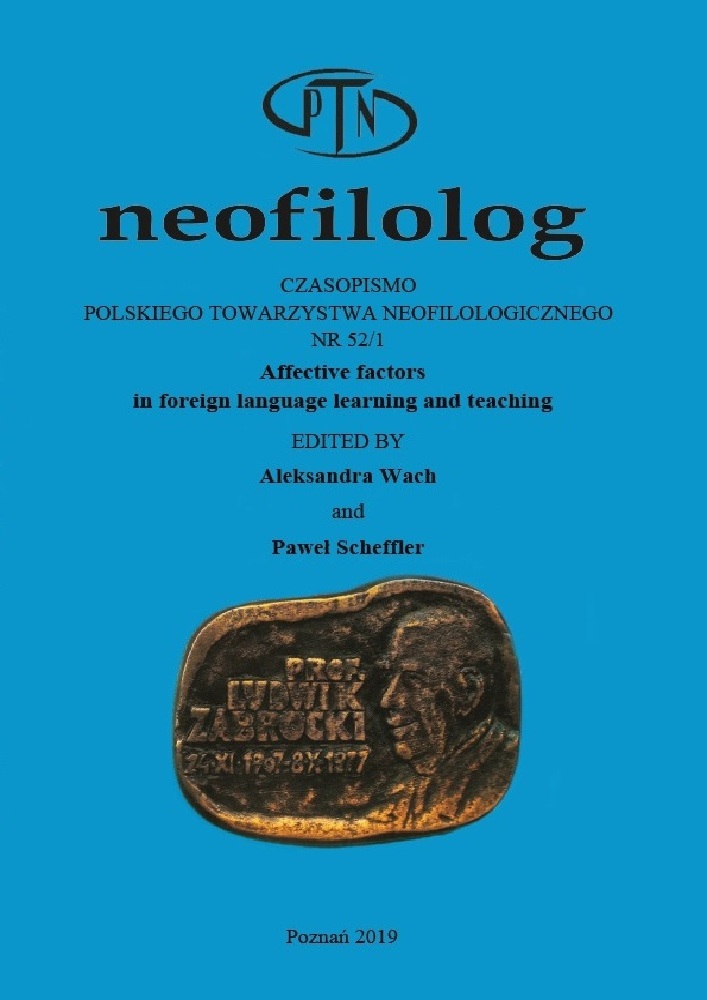Abstract
The article presents ‘didactic dialogue’ against the background of other interactive forms of remediation in foreign language learning. Drawing on the works of Antoine de La Garanderie, Reuven Feuierstein and Pierre Vermersch, three didactic approaches have been analyzed. Theoretical considerations have been illustrated with conclusions formulated on the basis of own studies on the use of dialogues in different educational contexts, which included: the diagnosis and remediation of language deficits of special educational needs students, remediation in the case of school failure in foreign language learning, and an interview after completing a task of retelling a story.
Literaturhinweise
Barth B-M. (1993), Le savoir en construction. Former à une pédagogie de la compréhension. Paris: Retz.
Feuerstein R., Spire A. (2009), La pédagogie Feuerstein ou La pédagogie à visage humain. Latresne: Le Bord de l’eau.
Garanderie de La A. (1982), Pédagogie des moyens d’apprendre. Paris: Le Centurion.
Garanderie de La A. (1989), Défense et illustration de l’introspection. Paris: Le Centurion.
Gębal P. E. (2013), Modele kształcenia nauczycieli języków obcych w Polsce i w Niemczech. W stronę glottodydaktyki porównawczej. Kraków: Wydawnictwo Księgarni Akademickiej.
Jodłowiec M., Niżegorodcew A. (red.) (2007), Dydaktyka języków obcych na początku XXI wieku. Kraków: Wydawnictwo Uniwersytetu Jagiellońskiego.
Karpińska-Szaj K. (2008), Motywacja jako konsekwencja działań dydaktycznych (na przykładzie pracy z uczniem z dysfunkcją mowy na lekcji języka obcego (w) Michońska-Stadnik A, Wąsik Z. (red.), Nowe spojrzenie na motywację w dydaktyce języków obcych (tom 2). Wrocław: Wydawnictwo
Wyższej Szkoły Filologicznej, str. 255-264.
Karpińska-Szaj K. (2010), Dialog w metodzie indywidualnych przypadków. (w) Widła H. (red.) „Glottodydaktyka jako nauka. Neofilolog”, nr 34, str. 81-90.
Karpińska-Szaj K. (2013), Nauczanie języków obcych uczniów z niepełnosprawnością w szkołach ogólnodostępnych. Poznań: Wydawnictwo Naukowe UAM.
Karpińska-Szaj K., Wojciechowska B. (2015), La performance morphosyntaxique dans les tâches de reformulation écrite. Cas d’étudiants débutants en FLE. (w) Gajos M. (red.) „Enseignement et apprentissage des sous-systèmes de langues romanes. Neofilolog”, nr 44/1, str. 73-90.
Le Poul H. (2002), Le dialogue pédagogique [w:] Éduquer [on-line], 1 | 2e trimestre 2002, mis en ligne le 15 octobre 2008, URL : http://rechercheseducations.revues.org/16 [DW 16.01.2016].
Michońska-Stadnik A., Wąsik Z. (red.) (2008), Nowe spojrzenie na motywację w dydaktyce języków obcych (tom 2). Wrocław: Wydawnictwo Wyższej Szkoły Filologicznej.
Miller W. R., Rollnick S. (2014), Dialog motywujący. Jak pomóc ludziom w zmianie. Kraków: Wydawnictwo Uniwersytetu Jagiellońskiego.
Rada Europy. ([2001]/2003), Europejski system opisu kształcenia językowego. Strasburg: Editions Dider.
Sujecka-Zając J. (2016), Kompetentny uczeń na lekcji języka obcego. Wstęp do glottodydaktyki mediacyjnej. Lublin/Warszawa, Werset/Instytut Romanistyki UW.
Vermersch P. (2014 [1994]), L’entretien d`explicitation. (8ème édition augmentée). Paris: ESF éditeur.
Wilczyńska W. (2007), Wielojęzyczność – przegląd problematyki w ujęciu dydaktycznym (w) Jodłowiec M., Niżegorodcew A. (red.), Dydaktyka języków obcych na początku XXI wieku. Kraków: Wydawnictwo Uniwersytetu Jagiellońskiego, str. 27-40.
Lizenz
Copyright (c) 2019 Katarzyna Karpińska-Szaj, Jolanta Sujecka-Zając

Dieses Werk steht unter der Lizenz Creative Commons Namensnennung - Keine Bearbeitungen 4.0 International.
Autoren:
Die Autoren der zur Veröffentlichung in der Zeitschrift Neofilolog angenommenen Texte sind verpflichtet, den Vertrag über die Erteilung einer kostenlosen Lizenz für die Werke mit der Verpflichtung zur Erteilung einer Sublizenz CC auszufüllen, zu unterzeichnen und an die Adresse der Redaktion zurückzusenden.
Gemäß Vertrag erteilen die Autoren auf die in der Zeitschrift Neofilolog veröffentlichten Texte der Adam-Mickiewicz-Universität in Poznań eine nicht exklusive und kostenlose Lizenz und erlauben die Verwendung der Sublizenz Creative Commons Attribution-NoDerivatives 4.0 International (CC BY-ND 4.0).
Die Autoren behalten das Recht zur weiteren freien Verfügung über das Werk.
Benutzer:
Interessierte Onlinebenutzer dürfen die seit 2017 veröffentlichten Werke unter folgenden Bedingungen nutzen:
- Anerkennung der Urheberschaft - die Verpflichtung, zusammen mit dem verbreiteten Werk Informationen über die Urheberschaft, den Titel, die Quelle (Links zum Originalwerk, DOI) und die Lizenz selbst bereitzustellen;
- ohne Schaffung abgeleiteter Werke - das Werk muss in seiner ursprünglichen Form erhalten bleiben, ohne Zustimmung des Autors dürfen keine Studien, beispielsweise Übersetzungen, verbreitet werden.
Die Urheberrechte aller veröffentlichen Texte sind vorbehalten.
Sonstige:
Die Adam-Mickiewicz-Universität in Poznań behält das Recht auf die Zeitschrift als Gesamtheit (Layout, Grafik, Titel, Umschlagsprojekt, Logo usw.).

